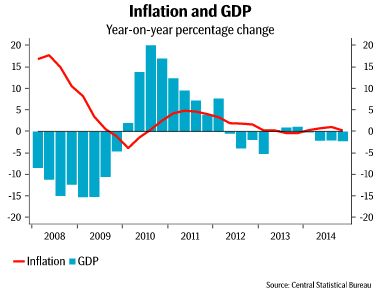Analytics, Baltic States – CIS, Economics, EU – Baltic States, GDP
International Internet Magazine. Baltic States news & analytics
Sunday, 01.02.2026, 22:34
Gradual economic recovery continues in Central Europe and Baltic countries in 2015
 Print version
Print version
This is thanks to favorable factors, including continued good real incomes for households (especially in the Baltics), which ensures stable private consumption.
Latvia's GDP will see a decent growth of 2.7% in 2015, and 3.4% in 2016, after this year's dip to 2.5%.
Domestic consumption will remain the key driver. Exports will continue to increase at weak levels, though it should not be difficult to find alternative markets.

Russia’s GDP will fall by 5.0% in 2015 and by 1.0% in 2016. A slight oil price upturn will help stabilise the economy. The rouble is vulnerable but will gradually regain strength.
Ukraine will see a continued GDP decline this year, totalling 6.0%. The country’s falling currency – which will turn around and show a slight appreciation – will contribute to weak export-driven growth of 1.0% in 2016.
Poland, with relatively solid fundamentals, will experience GDP growth of 3.4% this year and 3.6% in 2016, making it the fastest-growing economy in Central and Eastern Europe. The negative growth impact of Swiss franc appreciation on many Polish home mortgage loans will be relatively minor.
Estonia’s strongly export-oriented economy is slowly working its way out of a relatively deep 2013-2014 growth slump. GDP will rise by 2.2% this year and 2.7% in 2016.
Latvia will see unchanged 2.4% growth this year, following by an acceleration to 2.7% in 2016. The approaching presidential election may lead to political instability, but the economy is robust.
Lithuania’s growth will slow a bit this year, to 2.6%, but accelerate to a solid 3.5% in 2016. The important energy sector will achieve a more secure situation, helped by a new liquefied natural gas terminal and electric power links that will radically decrease the country’s dependence on imported Russian energy.








 «The Baltic Course» Is Sold and Stays in Business!
«The Baltic Course» Is Sold and Stays in Business!

